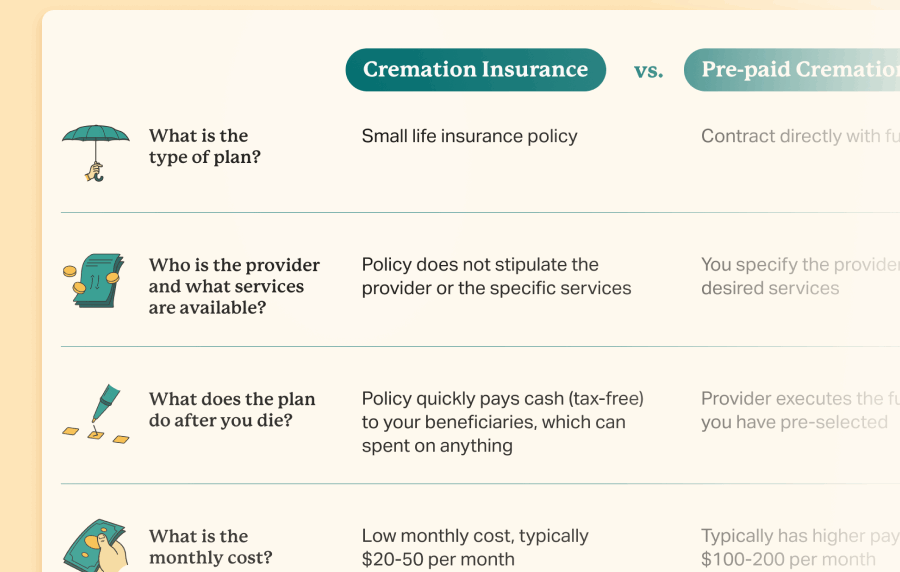Factors That Determine How Long It Takes For A Final Expense Insurance Policy To Payout
By design, burial insurance plans (also known as final expense insurance or funeral insurance) were designed to pay out quickly because the insurance companies know the coverage is generally meant to cover funeral expenses, which is a very time-sensitive issue.
However, it’s not as simple as you buy a policy on Monday, and if you die Tuesday, your family gets a check within 24-48 hours. While there are unscrupulous companies, such as Lincoln Heritage, that may give you that impression, trust that they are not being truthful in their messaging.
Regardless of which burial insurance company issues the policy, you must understand that a claim must be approved before any insurance company will cut a check.
The obvious question is, what does it take to approve a claim?
99.9% of the time, what it takes to approve a death claim depends on how long the policy was active when the insured died. Also, some very rare circumstances could cause a claim delay, such as fraud or if a beneficiary murders the insured.
We’ll discuss, in detail, all the things you need to know about these circumstances below.
Death that occurs in the first 24 months of the policy
First, if a policy has a waiting period, there is no chance of a death benefit being paid out in the first two years. Many plans have waiting periods, such as guaranteed acceptance policies with no health questions. Any non-accidental death during a waiting period type of plan will cause the insurer to refund your money, plus approximately 10% interest.
Alternatively, there are no waiting period final expense policies that fully cover you 100% the day you make your first payment for natural or accidental death. Additionally, some plans have partial coverage during the first two years. Typically, they will pay 30%-40% of the policy’s face amount during the first year and 50%-75% during the second year.
Here’s the indisputable truth that cannot be avoided. Any agent or company that claims otherwise is trying to scam you.
If you have a final expense policy with full or partial coverage and you die in the first two years, the insurance company will order your medical records before paying your claim. The insurer’s right to investigate the claim within the first two years is referred to as the contestability clause, which is present in all life insurance policies (with no exceptions).
Essentially, they will review your medical history to ensure you were truthful when you originally applied. Remember, the requirements for a burial policy don’t entail providing your medical records upfront. They heavily rely on your honest answers to determine your eligibility.
If they find you were forthcoming, they will pay your claim in full (even if you died the day the policy started). However, let’s say they found documented evidence of a health issue(s) present when you applied (not after the policy issue) that would have caused them to deny you coverage. In that case, they will not pay your claim. They would only refund your money.
Ultimately, deaths in the first two years could take many weeks or months, as it pertains to how long it takes to pay out a burial insurance claim. It takes time for the insurance company to get your medical records from various physicians and review them to determine if you were honest when you answered the health questions.
Death that occurs after 24 months
Whether you had a policy with or without a waiting period, claims that occur after 24 months are typically paid within 24-72 hours once they have the necessary documentation, such as a death certificate or confirmation from a funeral home with the body, is received.
Also, remember that funeral homes will almost always immediately execute the funeral services when they see you have a life insurance policy that is older than two years. They know the claim will 100% be paid soon, which is why they’re okay with performing the services right away.
Most of the time, they’ll complete an Assignment A legal agreement that directs a portion of a deceased person's life insurance policy benefits to the funeral home. Only the beneficiary can execute this action, and they decide how much of the death benefit to assign. This allows the funeral home to immediately carry out the funeral without having to wait for a life insurance claim to finalize. , which means that you have the insurance company send the funeral home the money they’re due, and you retain any remaining funds.
Rare circumstances, regardless of when death occurs
Although rare, some exceptional cases may cause a delay in the payment of a burial policy, regardless of its length of time in effect.
- Fraud: The insurance company must have compelling evidence that the policy was issued under fraudulent terms. Someone would have had to forge signatures on the application or provide false documentation to get the policy approved. Additionally, the insurance company would need clear evidence of the alleged fraud to initiate an investigation. Without proof, an insurer would likely never know of the fraud committed against them, and there’s not much they can do about it without evidence. However, if there is proof of fraud, the claim payout would be delayed indefinitely until the investigation is completed.
- Murder: If an insurance company sees that the insured was unlawfully killed at the hands of the beneficiary, they will investigate. The claim will be held in suspense until their investigation is complete, and the likely outcome will be no payout.
What Is Required To File A Claim On A Final Expense Policy?
To file a claim, you first need to call the insurance company.
Most funeral insurance companies will require that you provide either a death certificate (copies are acceptable) or that a funeral home confirms receipt of the deceased’s body.
Additionally, beneficiaries will be required to sign and complete a beneficiary statement. Once the insurance company has these documents, it can process the claim.
Be Wary Of Companies That Use Deceptive Advertising Meant To Fool You
Misleading advertising is one of the most common burial insurance scams.
Essentially, a company will use language in an advertisement that appears to convey a message it knows to be untrue. It’s not a lie per se, but it’s close to it.
Regarding how long a funeral insurance policy takes to payout, ads about quick payout times without context are very common.
Here are some of the typical ways this happens. Don’t take these advertisements at face value. There is a critical context they are omitting:
- “Claims paid in 24-48 hours”
- “One-day claim payout”
- “Immediate claim payout”
- “Claims paid in less than 72 hours”
As discussed earlier in this article, the context omitted from these ads is that a claim must first be approved before the quoted payout times can be realized.
By far, the biggest offender of this type of deceptive advertising is the Lincoln Heritage Funeral Advantage Program.
Most of their ads proclaim that “Approved Claims Paid in 24 Hours.” Notice that little word “approved”? That’s the key part they know consumers will overlook. The impression they want to convey is that you make your first payment today, and if you die tomorrow, your loved ones will get the full payout within 24 hours. As outlined in this article, that’s not how it works, especially if you die in the first two years.
Be cautious when you encounter ads about final expense insurance. Lincoln Heritage is one of many companies that advertise in this deceptive manner.
Frequently Asked Questions
Burial insurance is a unique type of whole life insurance. One of the primary differences between burial insurance and traditional life insurance is the expedited claims payout. Most conventional life insurance policies take 14-60 days to process a claim, whereas burial insurance plans can be paid in under 72 hours. Read burial insurance vs life insurance for more details.
There is no publicly available data on which company is the fastest at paying death claims. There are only rumors and online consumer feedback. At best, some companies make declarations in their advertisements about how quickly claims are paid. However, those should be taken with a grain of salt. That said, no life insurance companies contractually guarantee how long it takes for them to pay a death benefit. But generally speaking, you can rest assured that most final expense insurance companies pay out claims (once approved) in two to three business days.
To file a burial insurance claim, you must begin by notifying the insurance company. They will request a certified death certificate or a copy of it. Alternatively, some companies will allow a funeral home to provide proof of the deceased if they have the body. Beneficiaries will also have to sign a beneficiary statement to validate their identity.
Whether or not a funeral has been completed does not affect when a life insurance policy pays out. What determines the payout speed is A) the type of policy, B) when the insured died relative to how long the policy was active, and in some cases, C) the circumstances surrounding the death. Final expense life insurance is the fastest payout type of life insurance. Usually, approved final expense claims are paid in 24-72 hours.
In most cases, a graded burial policy is a type of modified whole life insurance plan with a waiting period of two years. That means death in the first 24 months will not result in a claim payout. The insurer only refunds your premiums. However, some burial insurance companies use “graded” to describe a partial coverage policy. With those, the insurer would pay out a portion of the death benefit if you die in the first two years. It’s not just a refund of your money. If you’re being offered a graded policy, be sure to ask questions and review your policy carefully so you fully understand how it works.
- Nationally licensed life insurance agent with over 16 years of experience
- Personal annual production that puts him in the top .001% out of all life insurance agents in the nation.
Anthony Martin is a nationally licensed insurance expert with over 16 years of experience and has personally served over 10,000 clients with their life insurance needs. He frequently authors entrepreneurial and life insurance content for Forbes, Inc.com, Newsweek, Kiplinger, and Entreprenuer.com. Anthony has been consulted as an expert life insurance source for dozens of high-profile websites such as Forbes, Bankrate, Reuters, Fox Business, CNBC, Investopedia, Insurance.com, Yahoo Finance, and many more.
- Nationally licensed life insurance agent with over 20 years of experience
- Best selling Amazon author.
Jeff Root is a nationally licensed life insurance expert with over 20 years of experience. He has personally helped over 3000 clients with their life insurance needs. Jeff is a best-selling Amazon author and the managing partner of a highly successful insurance brokerage that manages over 2,500 licensed insurance agents across the USA. He has been a featured life insurance source for prestigious websites such as Forbes, Bloomberg, MarketWatch, Nerdwallet, and many more.
- Nationally licensed life insurance agent with over 15 years of experience
- Best selling Amazon author of five insurance sales books.
David Duford is a nationally licensed insurance expert with over 15 years of experience. He has personally helped more than 15,000 clients buy life insurance. David has been featured as an expert source for highly authoritative publications such as A.M. Best and Insurancenewsnet. He also runs one of the largest Youtube channels to help aspiring insurance agents serve their clients better.
- Nationally licensed life insurance agent with over 20 years of experience
- Best selling Amazon author.
Jeff Root is a nationally licensed life insurance expert with over 20 years of experience. He has personally helped over 3000 clients with their life insurance needs. Jeff is a best-selling Amazon author and the managing partner of a highly successful insurance brokerage that manages over 2,500 licensed insurance agents across the USA. He has been a featured life insurance source for prestigious websites such as Forbes, Bloomberg, MarketWatch, Nerdwallet, and many more.
- Nationally licensed life insurance agent with over 15 years of experience
- Best selling Amazon author of five insurance sales books.
David Duford is a nationally licensed insurance expert with over 15 years of experience. He has personally helped more than 15,000 clients buy life insurance. David has been featured as an expert source for highly authoritative publications such as A.M. Best and Insurancenewsnet. He also runs one of the largest Youtube channels to help aspiring insurance agents serve their clients better.
Choice Mutual often cites third-party websites to provide context and verification for specific claims made in our work. We only link to authoritative websites that provide accurate information. You can learn more about our editorial standards, which guide our mission of delivering factual and impartial content.
-
contestability clause. https://www.nerdwallet.com/article/insurance/life-insurance-contestability-period








